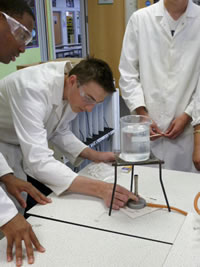IBDP (Diploma Programme)

The IB Diploma programme offers a broad, knowledge-rich curriculum which enables students to develop into well-rounded independent learners, perceptive critical thinkers and international citizens. Our Diploma students are highly sought after by leading universities and employers, including Oxbridge and Russell Group institutions.
IB Diploma students study three subjects at higher level and three at standard level. Diploma students should choose one subject from each of the groups in the tables below (N.B. If you do not wish to study a group 6 arts subject, then you may choose another from groups 2, 3 or 4).
In addition, students are further enriched through the DP Core Programme, which includes the Theory of Knowledge course (TOK), the Extended Essay (EE) and Creativity, Activity, Service (CAS).
Each subject attracts a maximum of 7 points, and the Core supplies the extra 3 points to make the maximum mark of 45. In 2023, the average point score for Dane Court students was 36, which is equivalent to A*A*A at A Level and places our Sixth Form significantly above local, national and international benchmarks.
Students should choose one subject from each group unless other choices are indicated below.
Key: Level offered: H: Higher-level; S: Standard Level; A: Ab initio (from scratch)
| Subject Groups | Subject Choices Available |
|---|---|
| 1. Literature | English Literature (S or H) |
| 2. Languages | French, German, Spanish (all S, H or A); Japanese (A) |
| 3. Humanities (Individuals and societies) | Economics, Global Politics (both H only), Geography, History, Philosophy, Psychology, Anthropology (all S and H) Environmental Systems (S) |
| 4. Sciences | Biology, Chemistry, Physics (all S and H) Computer Science (H and S), Food Science (S), Environmental Systems (S) |
| 5. Mathematics | Mathematics (S or H) Mathematics - Analysis and Approaches Mathematics - Applications and Interpretation |
|
6. Creative Arts (optional) |
Film, Music, Theatre, Visual Arts (all S or H) NB. If you do not wish to study a group 6 arts subject you may choose another from groups 2/3/4 |
The Core Programme
The Core Programme within the IBDP is comprised of Theory of Knowledge (TOK), Creativity, Activity, Service (CAS), and the Extended Essay (EE). These three elements are an integral part of the DP experience. The IB subjects, while separate to the core, are nonetheless linked to it. The Core relies on the subject disciplines to provide enrichment, and individual subjects should be nourished by the Core. TOK, CAS and the EE can feed into a deeper understanding of the subject matter studied by DP students in addition to leading students to develop transferable skills which are highly valued by universities and employers.
Theory of knowledge (TOK):
Students reflect on the nature of knowledge, how we know what we claim to know and how each subject discipline offers a unique critical lens on the world. They will also learn how to think critically and distinguish between truth and falsehood, a crucial skill in today’s world. Students develop valuable presentation skills.
The Extended Essay (EE): an independent, self-directed piece of research on a topic of your choice, finishing with a 4,000 word paper
Creativity, activity, service (CAS): students complete a project related to these three concepts in order to make a contribution to the community and to develop valuable transferable skills e.g. National Citizen Service, Margate Arts Club, Zone Youth Club, Broadstairs.
FAQs - The IBDP
Do I have to study for the full IBDP?
If you feel that the full DP does not meet your needs then you can discuss a bespoke programme with us.
How much homework will I have?
You can expect around 3 hours homework for a Higher Level subject and 2 hours homework for a Standard Level subject.
Does the IB use coursework for assessment?
The IB courses all contain coursework that is referred to as Internal Assessments or IAs.
The amount of coursework in each subject varies but you will see full details in the prospectus.
How does the IB grading system work?
Each of the six subjects is graded out of seven. The Extended essay and Theory of Knowledge are combined to give up to three core points. The total diploma score is therefore a maximum 45 points.
Can I study more than three highers?
It is not possible to study more than three higher level subjects because there would not be time to study the three standard level subjects and the core.
Also there isn’t a requirement for this for university study.
Can I take three sciences?

Because of its emphasis upon breadth, the International Baccalaureate diploma does not allow a student to take three sciences.
Chemistry and one other Science or Maths are standard subject requirements for UK medical schools.
How will studying the IBDP lead me to top university destinations?
The IBDP is regarded as a world-class gold-standard qualification by leading universities in the UK, the US and across the world. 96% of our applicants received offers from their first-choice universities in 2023.
Research has shown that IB students are more likely to excel in their degree course than A level students, as they have been so well prepared for the rigours of academic life whilst studying in the sixth form.
How will studying the IBDP help me with applications for medicine/veterinary/dentistry?
Medical schools recognise the value of the IBDP in allowing students to study knowledge-rich Science and Maths courses in addition to developing their communication skills and critical thinking – which are crucial attributes for a doctor. We also offer an Emerging Medics programme at Dane Court comprising work placements, entrance test practice and guest speakers.
Can I apply to university if I am not doing the full IBDP?
Yes. You will accrue points from all the subjects you are taking and universities will accept a combination of IB subjects as long as you meet their academic entry criteria.
